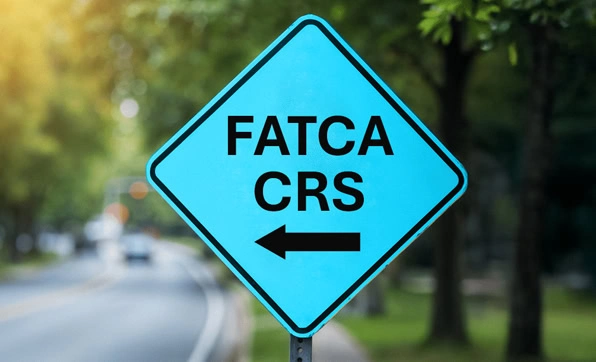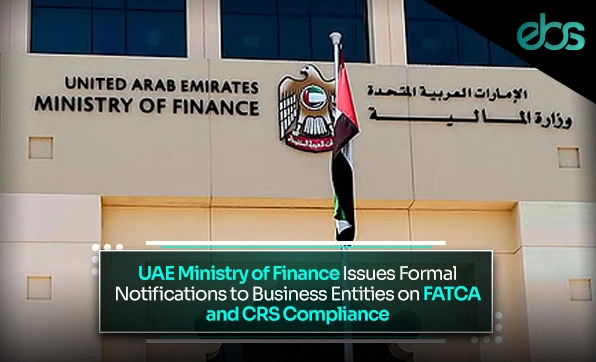The United Arab Emirates (UAE) continues to demonstrate its dedication to global financial transparency and regulatory alignment. Recently, the UAE Ministry of Finance (MoF) notification 2025 has started issuing formal communications to business enterprise entities throughout the country—which includes the ones working in free-zones—reminding them of their to ensure they are in complete compliance with the Foreign Account Tax Compliance Act (FATCA) and the Common Reporting Standard (CRS). This significant move highlights the UAE’s proactive approach to complying with international tax transparency standards and combating tax evasion.

Understanding FATCA and CRS: A Brief Overview
Before diving into the ministry’s latest notifications, it is important to understand the nature and importance of FATCA and CRS compliance UAE businesses must maintain.
What is FATCA?
The Foreign Account Tax Compliance Act (FATCA) is a United States federal regulation enacted in 2010. It calls for foreign financial institutions (FFIs) and certain other non-financial foreign entities to report information about accounts held by U.S. taxpayers or foreign entities wherein U.S. taxpayers preserve substantial U.S ownership. The purpose of FATCA is to fight tax evasion by U.S persons.
What is CRS?
The Common Reporting Standard (CRS) is a global framework for the automated exchange of financial account information, developed by the Organization for Financial Co-operation and Development (OECD). Unlike FATCA, which targets U.S. taxpayers, CRS entails over a hundred participating jurisdictions worldwide, which includes the UAE, and calls for financial establishments to file records of approximately account holders who are tax citizens in different participating countries.
UAE’s Commitment to International Compliance
The UAE has made considerable strides in aligning its financial system with international tax compliance standards. By adopting both FATCA reporting obligations UAE and CRS, the UAE strengthens its reputation as a transparent and cooperative financial jurisdiction.
Key milestones include:
- Signing the Multilateral Competent Authority Agreement (MCAA) for CRS implementation in 2018.
- Signing an Intergovernmental Agreement (IGA) with the U.S. to enforce FATCA locally.
These efforts show the country’s strong regulatory alignment and commitment to global tax fairness.
What Do the UAE Ministry of Finance’s Notifications Mean for Businesses?
The latest formal notifications issued with the aid of the UAE Ministry of Finance constitute an important step in making sure that each applicable business enterprise entity apprehends and satisfies its FATCA and CRS obligations.
These notifications are being dispatched to an extensive variety of entities, which includes
- Financial establishments together with banks, investment firms and brokerage firms.
- Non-financial entities with FATCA or CRS reporting obligations
- Businesses working inside free-zones.
Deadlines and Reporting Timelines
The UAE Ministry of Finance has set clear deadlines for FATCA and CRS compliance:
- Registration on the FATCA/CRS system must be completed by April 30, 2025.
- CRS reporting and filing declarations are due by July 31, 2025, aligning with international timelines for automatic exchange of information.
These deadlines are critical for ensuring timely submission of accurate data and avoiding enforcement actions.
Why Include Free Zone Entities?
Free zones have historically enjoyed regulatory incentives to draw foreign investment. However, with the growing international emphasis on tax compliance and transparency, the UAE authorities are making sure that free-zones entities aren’t exempt from FATCA and CRS duties. This inclusion enables preserving the UAE’s recognition as an accountable financial center and ensures a level playing field for all corporations.
Key Compliance Requirements for Business Entities UAE
The ministry’s notifications emphasize numerous important compliance requirements:
- Registration: All UAE Reporting Financial Institutions (RFIs) must register on the UAE FATCA/CRS system portal (https://fatcacrs.mof.gov.ae) to submit their reports and risk assessments by the stipulated deadlines.
- Due Diligence Procedures: Identify whether account holders are U.S. persons (for FATCA) or tax citizens of CRS-taking part jurisdictions.
- Reporting Obligations: Entities are required to publish periodic reviews containing applicable financial account records to the UAE’s Federal Tax Authority or different targeted authorities.
- Record-Keeping: Entities need to keep the records of due diligence and reporting for a designated period, commonly 5 years, to make certain audit readiness.
- Timely Submission: Reports need to be submitted inside time limits set up with the aid of using the ministry to keep away from penalties.
- Awareness and Training: Entities are advocated to educate their workforce and replace inner regulations and structures to conform with FATCA and CRS requirements effectively.
Implications for UAE Businesses
The ministry’s initiative indicates a clear message: non-compliance with FATCA and CRS guidelines will now no longer be tolerated. Businesses need to take instant action to study their compliance frameworks. Here are a few realistic steps UAE corporations need to consider:
- Conduct a Compliance Gap Analysis
Entities need to check their modern FATCA and CRS compliance status, figuring out gaps in due diligence processes, reporting mechanisms, and record-maintaining practices.
- Update Internal Policies and Procedures
Based on the space analysis, corporations want to replace or set up complete regulations and methods that align with FATCA and CRS requirements.
- Invest in Training and Awareness
Ensuring that personnel chargeable for compliance apprehend the guidelines and their duties is crucial. Regular schooling classes and updates on regulatory adjustments can assist in preserving compliance.
- Leverage Technology Solutions
Many financial establishments are adopting automatic compliance software programs to streamline due diligence, reporting, and record-keeping, lowering the threat of mistakes and penalties.
- Engage Professional Advisors
Given the complexity of FATCA and CRS guidelines, consulting with legal tax advisors that specialize in global tax compliance can offer precious guidance.
Conclusion
The UAE Ministry of Finance’s 2025 notifications regarding business entities, including those in free zones, mark a pivotal step in the country’s journey toward full FATCA and CRS compliance. As the UAE continues to integrate with the global financial system, businesses must prioritize compliance to safeguard their operations and contribute to a transparent and fair international tax environment.
Need Help?
ebs Chartered Accountants can help your business comply with FATCA and CRS regulations by providing expert accounting, audit, and tax advisory services tailored to UAE regulatory requirements. Contact us today to ensure your operations remain secure, compliant and globally competitive.
FAQs
What is FATCA and CRS compliance?
FATCA and CRS are international tax standards requiring financial institutions to report account information to prevent tax evasion.
Who must comply with the UAE’s FATCA and CRS regulations?
All financial institutions and relevant business entities in the UAE are required to comply.
What did the UAE Ministry of Finance notify businesses about?
It issued formal notices reminding entities to ensure timely and accurate FATCA and CRS reporting.
What are the consequences of non-compliance?
Non-compliance can result in financial penalties and reputational risks.

